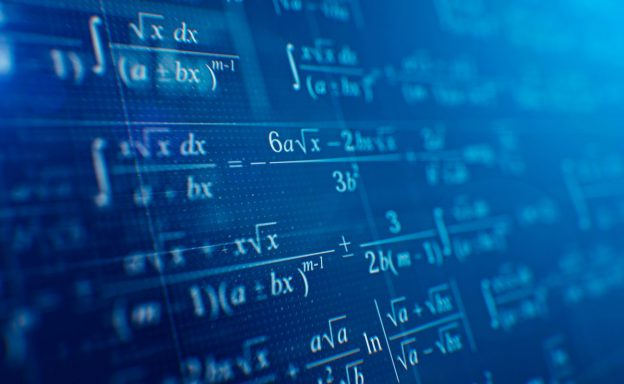Two schools of thought vie for dominance in gambling. One is that nothing can be controlled and every spin and choice comes down to pure chance. The other maintains that it’s possible to unlock the mathematics of gambling to win big. We know the truth is somewhere in between. Join us as we explore the art and science of gambling.
You are probably reading this blog because you play online casino games or enjoy a round of poker or a go at the slots. We keep returning to our favourites, not only for the entertainment factor, but because there’s always a chance of winning real money and prizes at the next pull of a lever, the click of a keypad or turn of a card.
Whether you’re an experienced better, particularly ambitious, or fancy yourself a bit of a brainbox, there comes a time in most players’ lives when they start to look past the luck and think about the maths of gambling and how it can be used to determine a profitable bet.
While some might maintain that this just isn’t possible, arithmetic has been used for hundreds of years to ensure the profitability of gambling for both casinos and players. When applied to sports betting, the ability to calculate the odds ensures that sportsbooks generate an income no matter the result. And now with most of the world’s gambling activity happening at online casinos, you can bet the science behind the software is precise and has been carefully calculated.
Chidi Akusobi, writing in Yale Scientific, cites the case of Peter Eastgate, a pro poker player who prevailed against 6,843 other gamblers to become the youngest player – aged just 22 – to win the World Series of Poker and take home more than £7 million cash. Akusobi maintains that Eastgate did not get a spot on the list of highest earning poker players through chance alone. He based his game on probabilities and gambling statistics that underpin most betting games. Interestingly, the basic principles he cites are widely used to forecast financial markets and return on investment. They are definite probabilities, expected value and volatility index.
So let’s explore some of the most common methods of calculation used in gambling today.
Working out probability
If you’ve ever thought “what are the chances of that happening?” you’ve been thinking about probability. This is really a fancy way of looking at how likely something is to happen. Probability attempts to work out how many times, on average, an event will occur. The scale starts at a particular event happening zero percent of the time, and ends with something happening 100 percent of the time. The probable frequency of something occurring will fall somewhere between zero and 100 percent. Mathematicians call this the “sample space”.
Probability is also used to work out the conditions needed to get certain results or the financial prospects of a casino game over a longer period of time.
Probability can be expressed as a fraction (say 1/2), as a percentage (such as 50%) or as a proportion between 0 and 1 (p = 0.50). Now if there are two tickets in a draw and a better owns one of them, the probability of winning is 1 in 2, or 50%, or p = 0.50.
Applying this to gambling, a die has six sides (our sample space) and the probability of landing on any one of those six sides when tossed is 1/6. Keep in mind that games such as poker that have very large sample spaces are made up of events with small probabilities. This is why probability is used most often in games like blackjack, craps or roulette.
The actual formula used to calculate probability is expressed as √npq, or the square root of the number you get by multiplying together “n” – the number of rounds played – “p” the – probability of winning – and ‘’q’’ – the probability of losing.
Things get really complicated when you consider that this includes the Volatility Index – the so-called “standard deviation” for one round – and something called the Variance, or the square of the Volatility Index. Why this formula works best with smaller sample spaces is the subject of the companion article to this one – Gambling Mathematics for Brainboxes.
Calculating the odds
Although similar to probability, gambling odds refer to a player’s chances of losing as compared to their chances of winning. This is also expressed as the average frequency of a loss to the average frequency of a win. So using our earlier example, if a better has 1 of 2 tickets, their probability of winning is 1 in 2 while the odds are 2 to 1. In other words, they have two chances of losing and one chance of winning.
Now if you wanted to change odds to probability, you would take your chance of winning and divide this number by the total number of chances for both winning and losing. This would look something like this: If the odds are 2 to 1, the probability equals 1 / (1 + 2) = 1/3 or 33.3%. Odds of 1 to 1 (50%) are called “evens” and a payout of 1 to 1 is referred to as “even money.”
When reading odds in gambling, keep in mind that they usually indicate a subjective estimate of the odds and not a precise mathematical calculation. In sports betting, the odds posted by a sportsbook are not the chances of winning on that bet but the payout odds – or the ratio of payout for each unit bet. So, in practice, the odds for a favourite team might be quoted as 2 to 1 (or 33.3%), but what this really means is that the sportsbook will pay £2 profit for every £1 bet.
Counting cards
It’s a popular myth that to count or read cards you must be a savant with extraordinary mental abilities. Players using this system assign a score to each card they see. This approximates the value of that card, and the player then tracks the sum of these values. It’s used most often by Blackjack players so they know when a game advantage has shifted in their favour and they can increase their bets.
If you’re tempted to start practicing, be warned. The technique is challenging enough when you’re playing with a single deck, but it gets harder as you play with multiple decks – most casinos use four to eight decks for Blackjack.
And if you play Blackjack at an online casino, the deck is automatically reshuffled after every hand, so you’d have a better chance of maximising your advantage by taking advantage of the bonuses on offer.
Although card counting isn’t illegal in the UK, the practice is generally frowned upon and you might find yourself blacklisted if caught.
The law of large numbers
For the purpose of gambling statistics, the law of large numbers states that if the same action is repeated independently many, many times, the average of the results of the trials must be close to the expected value. In other words, even random events repeated often enough may return stable long-term results. So, in practice, if you toss a die three times and the outcomes were 6, 6, 3, you would have an average result of 5.
According to the Law of Large Numbers – known by statistics nerds as the LLN – if you tossed the die many times, over and over again, the average result would be closer to 3.5.
Many gamblers believe that the more often you play, the more likely you are to win, but this is not necessarily the case.
The LLN allows a casino to turn a consistent profit. Even with a slight benefit of the odds in the game, over time, the results of all the bets and chances will reflect the odds. Yes, there are variations and wins, but on average with many attempts, the house wins.
The takeaway from this look at the mathematics of gambling is that there are some advantages you can get from calculating probability, working out the odds and even applying the LLN, but the real attraction is that there really is no foolproof way to win at gambling. It’s the element of luck or chance that a win can happen to anyone on any day of the year that keeps us coming back for another spin or draw. You don’t need to be a statistics nerd.
If you’re up to trying your luck, you can play online casino games at Grosvenor Casinos. Our truly unique live casino experience allows you to enjoy all the excitement of blackjack, baccarat, live poker and more, with no download required to play – just an authentic casino experience every time.





Leave a Reply